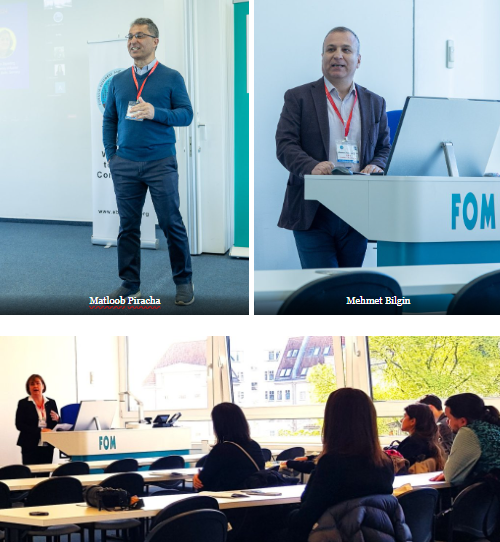EBES 47 and GLO Berlin 2024, a larger joint conference hosted by FOM University of Applied Sciences in Berlin took place during April 18-20, 2024. EBES and GLO are very grateful for the wonderful setup and effective support of FOM, in particular by Manuela Zipperling, FOM’s Berlin Head.
Conference welcome by GLO Director Matloob Piracha, EBES Vice President Mehmet Bilgin and FOM Berlin Head Manuella Zipperling.
FOM Head Manuella Zipperling during the conference opening
On the initiative of EBES and its Vice-President Mehmet Huseyin Bilgin, a session in honor of Klaus F. Zimmermann, President of EBES and GLO, was organized and took place on April 18. The panel session was a guided tour of some parts of Zimmermann’s academic life of Zimmermann and a review of some of his academic contributions.
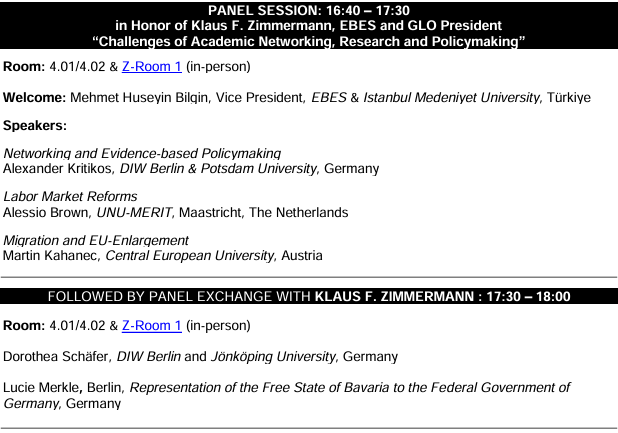

Networking and Evidence-based Policymaking: Zimmermann was strongly involved in networking, the creation of infrastructure for research and policy advice, and supporting evidence-based policymaking. Examples include (see LINK for more). 1986: Creation of the European Society of Population Economics (ESPE), first Secretary, and later President of ESPE. 1991-2001: Program Director of the Centre for Economic Policy Research (CEPR) for first “Human Resources” and later for “Labour Economics”. 1998-2016: Director of IZA, building up of IZA’s research network. 2000-2011: President of Deutsches Institut für Wirtschaftsforschung (German Institute for Economic Research, DIW Berlin). 2014 – 2020: Chair of the Section for Economics, Business and Management Sciences of the Academia Europaea, the Academy of Europe. Since 2017: President of Global Labor Organization (GLO) gGmbH. About 2100 members in over 131 countries. Since 2023: Leopoldina: Senator and Chair (“Obmann”) of Section 25 “Economics and Empirical Social Sciences” of Leopoldina, the National Academy of Sciences of Germany. Zimmermann has also created the Journal of Population Economics (JOPE) and manages it since 37 years. Its impact factor makes JOPE the leading academic journal in demography and a top field journal in economics. For a review of his publications on evidence-based policymaking, see LINK. Contributions include K. F. Zimmermann: “Advising Policymakers through the Media”, Journal of Economic Education (2004); 35, 4; 395-405. K. F. Zimmermann: “Der Berater als Störenfried: wirtschaftswissenschaftliche Politikberatung”, Wirtschaftsdienst, 88 (2008), 101-107. R. Ketzler; K. F. Zimmermann: “A Citation-Analysis of Economic Research Institutes”. Scientometrics, 95 (2013), 1095-1112. K. F. Zimmermann: Evidenzbasierte wissenschaftliche Politikberatung, Schmollers Jahrbuch, 134:3 (2014), 259-270. Zimmermann created with Alexander Kritikos the IZA World of Labor project, see “Evidence-based Policy Making in Labor Economics. The IZA World of Labor Guide 2015.”, Bloomsbury London, New York 2015. Kritikos is a member of the Board of DIW Berlin and a Professor at the University of Potsdam.
Labor Market Reforms (Agenda 2010 & beyond): As DIW President, IZA Director and Chairman of the Society of the German Economic Research Institutes (ARGE), Zimmermann was a close advisor of the Federal Government including the chancellor Gerhard Schröder, the responsible reform minister of economics and labor (Wolfgang Clement) as well as the CEO of the German Federal Agency for Employment (Frank-Jürgen Weise). In addition, frequent exchanges with Alan Krueger, chief economist (Council of Economic Advisors) of Barack Obama in Washington, as well as with policy advisors in Beijing. Before the reforms: Only four of the about 80 labor market instruments in place could be shown to have some effect (“And Then There Were Four … How Many (and Which) Measures of Active Labor Market Policy Do We Still Need?, Applied Economics Quarterly, 53, 2007, 243-272; Zimmermann with W. Eichhorst). After the successful reforms, Germany’s labor market responded only mildly to the Great Recession. Important factors for this development include a strong economic position due to recent labor market reforms, the crisis mainly affecting export-oriented companies, the extension of short-time work, time buffers due to working time accounts, the behavior of social partners, and automatic stabilizers (“Another Economic Miracle? The German Labor Market and the Great Recession”, IZA Journal of Labor Policy, 1 (2012), Article 3; Zimmermann with U. Rinne). Short-time work was a core instrument to fight unemployment during the Great Recession (“Short-Time Work: The German Answer to the Great Recession, International Labour Review, 152, 2013, 287-305; Zimmermann with K. Brenke and U. Rinne). Germany became the role model for an effective labor market policy (“Is Germany the North Star of Labor Market Policy?”, IMF Economic Review, 61, 2013, 702-729; Zimmermann with U. Rinne). Alessio Brown is co-director of POP at UNU-MERIT and has been Director of Strategy and Research Management and Member of the Board at IZA. He was the Founding Director of GLO.
Migration and EU-Enlargement: Richard Portes of CEPR had appointed Zimmermann in 1991 as the Program Director Human Resources to initiate migration economics in Europe through networking and the organization of a larger number of research conferences. The project output included stock taking books like “Migration. The Controversies and the Evidence” (1999, Zimmermann with R. Faini & J. de Melo), Cambridge University Press, and “European Migration: What Do We Know?” (Zimmermann, 2005), Oxford University Press. These initiatives have had a very strong and lasting effect on the development of the field. Zimmermann continued this work later in his role as IZA Director in Bonn, collaborating closely with Martin Kahanec on the migration consequences of EU East enlargement starting in May 2004, two decades ago. Leading international research teams, both published a series of books and research reports including “EU Labor Markets After Post-Enlargement Migration” (2010, Zimmermann with Kahanec), Springer-Verlag and “Labor Migration, EU Enlargement, and the Great Recession” (2016, Zimmermann with Kahanec) Springer-Verlag. In 2013, Zimmermann received the Outstanding Contribution Award of the European Investment Bank for his research on migration. Martin Kahanec was a senior researcher at IZA. He is a Professor at the Department of Public Policy at the Central European University (CEU) in Vienna and director of the Shattuck Center for Human Rights. Previously, Martin Kahanec acted as the Dean of CEU’s School of Public Policy. He is the Chair of the Section for Economics, Business and Management Sciences of the Academia Europaea, the Academy of Europe.
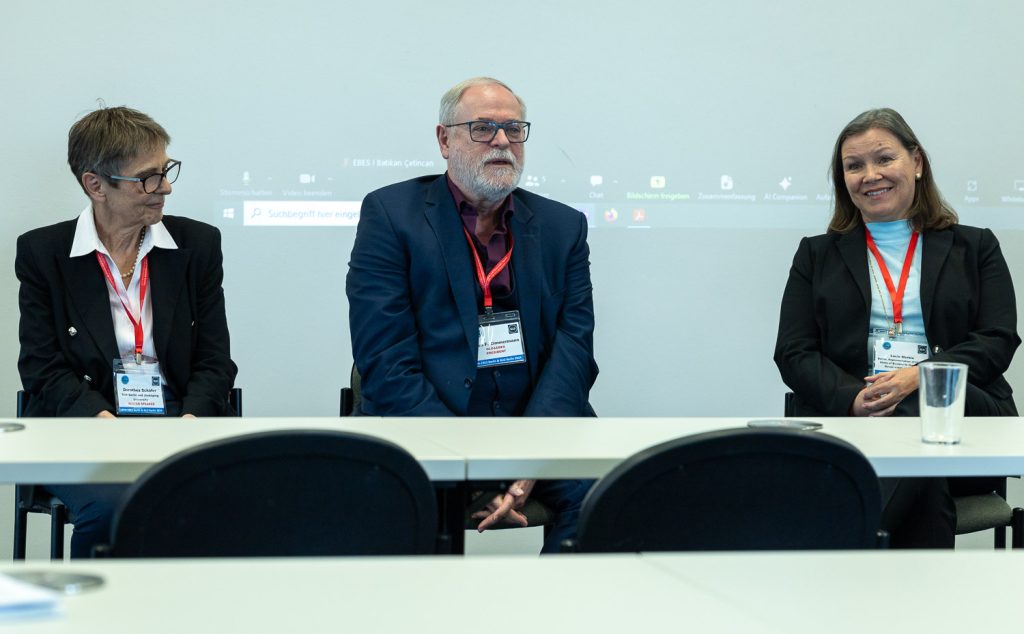
From the left: Dorothea Schäfer, Klaus F. Zimmermann, and Lucie Merkle
Lucie Merkle was one of the first doctoral students of Zimmermann during his tenure at the University of Munich. They co-authored 1992 “Savings, Remittances, and Return Migration” in Economics Letters 38, 77-81 (301 Google citations), a seminal paper on the savings behavior of migrants. A civil servant of the State of Bavaria, Merkle, has since served in the United States, China, Bruxelles, and Berlin.
During Zimmermann‘s period as President of DIW Berlin, Dorothea Schäfer was appointed Editor-in-Chief of the Vierteljahrshefte der Wirtschaftsforschung (Quarterly Journal of Economic Research), the oldest publication format of DIW Berlin founded in 1926. This outlet played an important role in communicating evidence-based advice for policymaking. During the financial market crisis, Schäfer and Zimmermann co-authored a bad bank proposal (Bad Bank(s) and Recapitalisation of the Banking Sector, Vox of 13 June 2009) in the spirit of the later employed reforms in the United States. Their 2010 joint book “Finanzmärkte nach dem Flächenbrand” reflected the crisis and draw lessons for policymaking. Dorothea Schäfer is the Editor-in-Chief of the Eurasian Economic Review.
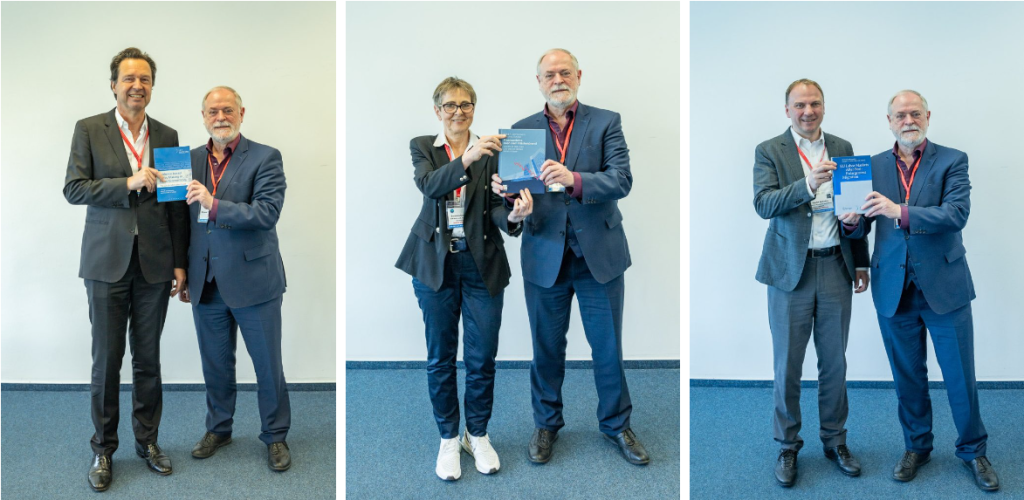
Highlights of joint collaborations (from the left):
Klaus F. Zimmermann & Alexander S. Kritikos (eds.): Evidence-based Policy Making in Labor Economics. The IZA World of Labor Guide 2015. Bloomsbury London, New York 2015.
Klaus F. Zimmermann & Dorothea Schäfer: Finanzmärkte nach dem Flächenbrand. Warum es dazu kam und was wir daraus lernen müssen. Gabler Wiesbaden 2010.
Martin Kahanec & Klaus F. Zimmermann (eds.): EU Labor Markets After Post-Enlargement Migration. Springer. Berlin. Heidelberg 2010.
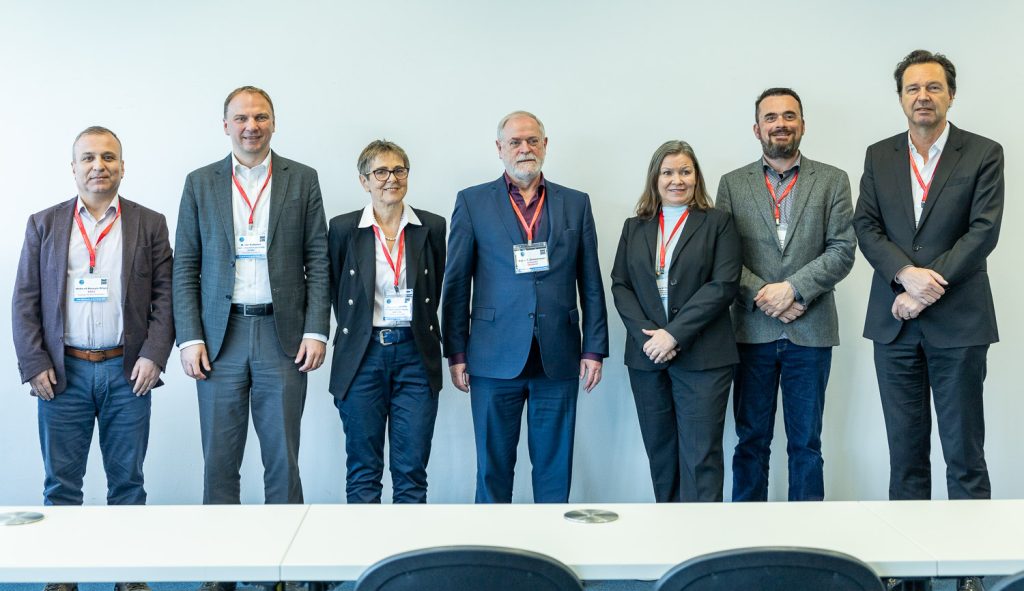
From the left: Mehmet Huseyin Bilgin, Martin Kahanec, Dorothea Schäfer, Klaus F. Zimmermann, Lucie Merkle, Alessio Brown, and Alexander Kritikos
Special dinner event on April 18:


